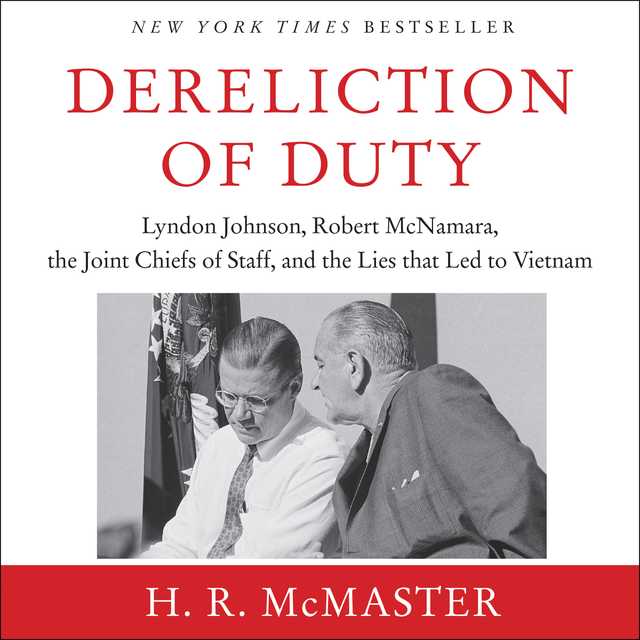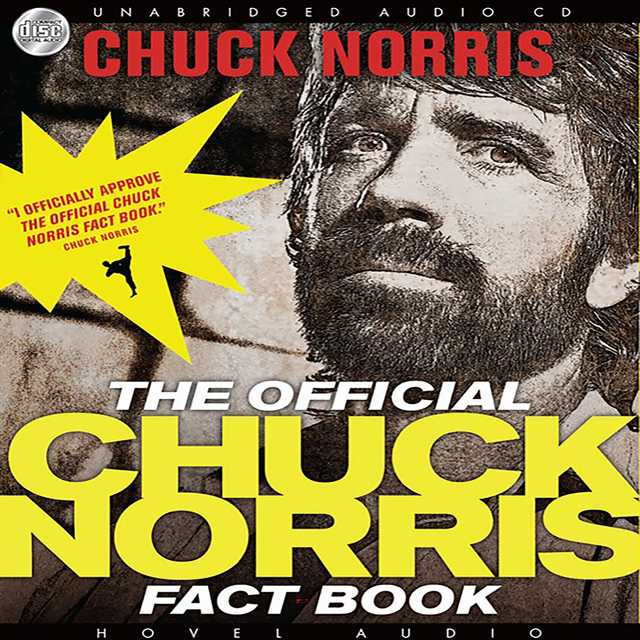Dereliction of Duty Audiobook Summary
“The war in Vietnam was not lost in the field, nor was it lost on the front pages of the New York Times or the college campuses. It was lost in Washington, D.C.”
–H. R. McMaster (from the Conclusion)
Dereliction Of Duty is a stunning analysis of how and why the United States became involved in an all-out and disastrous war in Southeast Asia. Fully and convincingly researched, based on transcripts and personal accounts of crucial meetings, confrontations and decisions, it is the only book that fully re-creates what happened and why. McMaster pinpoints the policies and decisions that got the United States into the morass and reveals who made these decisions and the motives behind them, disproving the published theories of other historians and excuses of the participants.
Dereliction Of Duty focuses on a fascinating cast of characters: President Lyndon Johnson, Robert McNamara, General Maxwell Taylor, McGeorge Bundy and other top aides who deliberately deceived the Joint Chiefs of Staff, the U.S. Congress and the American public.
McMaster’s only book, Dereliction of Duty is an explosive and authoritative new look at the controversy concerning the United States involvement in Vietnam.
Other Top Audiobooks
Dereliction of Duty Audiobook Narrator
H.R. Mcmaster is the narrator of Dereliction of Duty audiobook that was written by H. R. McMaster
Maj. H. R. McMaster is a 1984 graduate of the U.S. Military Academy at West Point. He holds an M.A. and Ph.D. in history from the University of North Carolina at Chapel Hill, where he began his research on the Vietnam War in 1992. He taught history at West Point from 1994 to 1996.
About the Author(s) of Dereliction of Duty
H. R. McMaster is the author of Dereliction of Duty
More From the Same
- Author : H. R. McMaster
- Battlegrounds
- Dereliction of Duty
- Publisher : HarperAudio
- Abraham
- American Gods [TV Tie-In]
- Dead Ringer
- House of Sand and Fog
- Prey
Dereliction of Duty Full Details
| Narrator | H.R. Mcmaster |
| Length | 3 hours 9 minutes |
| Author | H. R. McMaster |
| Publisher | HarperAudio |
| Release date | March 28, 2017 |
| ISBN | 9780062740939 |
Additional info
The publisher of the Dereliction of Duty is HarperAudio. The imprint is HarperAudio. It is supplied by HarperAudio. The ISBN-13 is 9780062740939.
Global Availability
This book is only available in the United States.
Goodreads Reviews
Brett
January 01, 2023
"[By July 1965] LBJ had misrepresented the mission of U.S. ground forces in Vietnam, distorted the views of the Chiefs to lend credibility to his decision against mobilization, grossly understated the numbers of troops General Westmoreland had requested, and lied to Congress about the monetary cost of actions already approved and of those waiting final decision." pg 330Wow, this was mind-blowing. After reading this, my first thought was: we never should have gone to Vietnam. McMaster wrote a clear and linear narrative that kept me thoroughly engaged the whole time. There wasn't information overload and detail-driven accounts. Instead it was well-written, well-researched, and written smoothly. On November 23, 1963 LBJ inherited the Vietnam ordeal from president JFK by default. With that he also took on JFK's mentality of inner-circle advisement, only trusting his closest civilian advisors, and viewing the Joint Chiefs of Staff with suspicion. The narrative examined LBJ's lack of clear direction by "taking the middle course" (pg 256), Gulf of Tonkin Resolution that bloomed into higher levels of intervention, and the preoccupation with his domestic agenda lead to confusion in his effective decision-making about Vietnam. Secretary of Defense McNamara's views "that intelligence and analytical methods would compensate for lack of military experience" (pg 328), his JFK-era thinking of carefully controlled and sharply limited military actions were reversible, and the use of "graduated pressure"starting in March 1964 would bring North Vietnam to negotiate and cease Viet Cong support. The Joint Chiefs of Staff continued to recommend an escalation of military effort without presenting a strategy aimed at focusing on an outcome consistent with U.S. interests (pg 264), went along with ongoing deception to Congress, placated LBJ and McNamara due to inconsistent communication, and remained loyal "five silent men" as the team to Coach Johnson.Overall this was an excellent account on the lead-up to war in Vietnam. These actions took place in the 196os and it was published in 1997. I wouldn't be surprised if a book of this shock-and-awe about Iraq and Afghanistan came out within the next 20-30 years. Anyway, highly recommended book about the LBJ administration and the early days of Vietnam. Thanks!
Scott
October 01, 2012
This is a very detailed and somewhat shocking book telling of how America sunk itself into the Vietnam war fiasco, and it's truly a sorrow to read. I never knew Johnson, McNamara, the Bundy brothers and Taylor were such lying assholes, as well as Rusk, McNaughton and the other civilians in charge of planning the war. They lied to the Joint Chiefs, to Congress, to the American people and to the world (sounds like Bush, doesn't it?) in order to downplay the role America was taking in Vietnam, all for varying agendas that sometimes met and more often didn't.The book starts with 1961 and Kennedy but quickly moves on to Johnson, who wanted his Great Society domestic program passed so badly that he literally flat out lied -- continuously -- to the Congress and America about his efforts to sink us into Vietnam -- without any goals or exit strategies, I might say.One thing the author, McMaster, hammered home really shocked me. We never thought we could win, never expected to win, and wanted to escape Vietnam just "bloodied." Excuse me, but WTF??? Why delve into a war if you have no intention of winning? Idiots! From page 184:"McNaughton, Forrestal, and William Bundy concluded that it would be preferable to fail in Vietnam after trying some level of military action than to withdraw without first committing the United States military to direct action against North Vietnam. They thought that the principal objective of military activities was to protect U.S. credibility.... Indeed, the loss of South Vietnam after the direct intervention of U.S. armed forces 'would leave behind a better odor' than an immediate withdrawal and would demonstrate that the United States was a 'good doctor willing to keep promises, be tough, take risks, get bloodied, and hurt the enemy badly.'"On page 237:"For McNaughton the objective of protecting American credibility had displaced the more concrete aim of preserving a free and independent South Vietnam. Even as Rolling Thunder began and Marines landed at Danang, McNaughton continued to plan for failure. He concluded that to avoid humiliation the United States must be prepared to undertake a 'massive' effort on the ground in Southeast Asia involving the deployment of 175,000 ground troops. Even if the Communists won, McNaughton believed that the United States would have protected its international image."Isn't that just batshit crazy? Johnson and McNamara didn't listen to the Joint Chiefs, who wanted to ramp things up immediately and hit North Vietnam hard, because they were afraid if we went after Hanoi, China and/or the Soviets would come to their aid and it would become another Korean War.As America begins to send troops to South Vietnam to start conducting offensive operations for the first time while refusing to mobilize the reserves, General Harold Johnson, the JCS in charge of the Army, "was to preside over the disintegration of the Army; a disintegration that began with the president's decision against mobilization. Harold Johnson's inaction haunted him for the rest of his life."McMaster really throws Johnson and McNamara under the bus, but apparently for good reason. He paints the JCS as little more than stooges kept out of the loop of actual military planning. It's not until the book's epilogue does he place some blame on the JCS, writing "the 'five silent men' on the Joint Chiefs made possible the way the United States went to war in Vietnam." His ultimate conclusion can be found on page 332:"Over time the maintenance of U.S. credibility quietly supplanted the stated policy objective of a free and independent South Vietnam. The principal civilian planners had determined that to guarantee American credibility, it was not necessary to win in Vietnam. That conclusion, combined with the belief that the use of force was merely another form of diplomatic communication, directed the military effort in the South at achieving stalemate rather than victory. Those charged with planning the war believed that it would be possible to preserve American credibility even if the United States armed forces withdrew from the South, after a show of force against the North and in the South in which American forces were 'bloodied.' After the United States became committed to war, however, and more American soldiers, airmen, and Marines had died in the conflict, it would become impossible simply to disengage and declare America's credibility intact, a fact that should have been foreseen."The only reason why I'm giving this book four stars instead of five is that it stops at July 1965. I would have liked to read more about what went on after inserting troops for offensive operations, how things escalated, what Johnson, McNamara and the rest did in educating America on what was happening (or not), etc. In other words, I think the author cut the book short and that was disappointing. Otherwise, it was a fascinating, while sobering, read and should be required reading of all active politicians to ensure we never repeat the stupid mistakes made during the '60s regarding Vietnam.
Ed
February 26, 2017
It you like histories of the bureaucratic minutiae and system failures that lead to bad advice badly given, institutional paralysis in the face of collapsing strategy and a determined refusual to accept reality (which I do) you will love this book.McMaster is a serving career Army officer with a PhD. in history. He has the analytical tools to do justice to the story of how the Joint Chiefs of Staff failed the nation in during the Vietnam war.It's been a few years since I read "Dereliction of Duty" but it is quite a book. McMaster re-fought the bureaucratic wars of 1965 and 1966 memo by memo--his main villain was Robert McNamara but he found plenty of blame to lay at the feet of the Joint Chiefs of Staff who (as I recall) McMaster accused of shirking their constitutional duty to advise the President and to to so truthfully. The generals wanted a huge force and an open ended schedule to "win" the war with Vietnam and McNamara simply didn't present it to Johnson. The JCS thought if they went along with McNamara's gradualism they would ultimately get the half-million men they wanted.He makes the point that the JCS knew better than anyone how the U.S. couldn't win in the field but simply allowed the Secretary of Defense to stop them from discussing it with Johnson.And in a real "ripped from the headlines" update McMaster has been appointed head of the National Security Council. Given the abrupt and ignominious departure of his predecessor he probably has a bit more room to disagree with the currency president than other appointees have.
Barry
April 25, 2017
McMaster has done a commendable piece of work detailing the machinations of the Joint Chiefs of Staff, Sec Def Robert McNamara, and LBJ. LBJ attempted a constant balancing act by trying keep the Joint Chief’s from publicly opposing military operations in Vietnam by pretending to take parts of their advice and promising “more later” in terms of less restrictions on future military operations, while simultaneously ordering carefully limited operations that were largely ineffective to “dissuade” Hanoi from supporting the Vietcong insurgency in the south without drawing too much public attention. While this mentality may help manage political problems it had no sensible application to military operations. Other reviewers have described the Chiefs as “five silent men” who let these policies continue, which indeed was the end result. However the book also covers the struggles of the Chief’s to give realistic military advice to LBJ (Air Force Chief of Staff Curtis Lemay and Marine Commandant Wallace Greene come to mind) while trying not to get kicked out of the policy loop altogether (which was what happened to Vice President Hubert Humphrey). Altogether, this is a sharp, and still relevant work.
Barry
November 18, 2020
Wow! A fascinating and well-researched book that goes behind the scenes into a place many people know nothing about. The lying and deceiving seems to never go away from Washington D.C.
Mark
March 09, 2012
A searing indictment of Lyndon Johnson, Robert McNamara, the White House staff and the Joint Chiefs for their actions and inaction during the lead up to the Vietnam War. Written by an active duty Army officer (then a Major, now a General), this book is based on meticulous research of meeting minutes and previously classified memos. The tragedy is summed up in the final sentence: "The failings were many and reinforcing: arrogance, weakness, lying in pursuit of self-interest, and above all, the abdication of responsibility to the American people."Should be mandatory reading at every service academy, ROTC program and White House orientation program.
Karen
June 05, 2017
Added this to my reading list when Gen. H.R. McMaster was picked by President Trump to replace Gen. Michael Flynn, who was fired amid a scandal involving his relationship with Russia's ambassador.Actually, McMaster was Trump's second choice, after Adm. Robert Harwood, who turned down the job, reportedly calling it a "shit sandwich" after he found out he wouldn't be able to hire his own staff. McMaster recently appeared before the press to try to explain Trump's meeting with Russian officials in the White House the day after Trump fired FBI Director James Comey, who had been investigating Russian ties to the Trump campaign and Russian meddling in the U.S. elections. Before the press conference, McMaster was quoted as saying, "This is the last place on earth I wanted to be." He also spoke to the press off-camera to try to deflect questions about Trump's son-in-law, Jared Kushner, who is allegedly under investigation for trying to set up a back channel with Russian officials. Yeah, I can't wait to read McMaster's next book either. I bet he thought it would be about fighting ISIS.Anyway, before lending his stature to the Trump administration, McMaster was perhaps best known for writing "Dereliction of Duty" about the Vietnam War and Johnson's relationship with his military and civilian advisors. Johnson is depicted as insecure and duplicitous. His civilian advisors (most notably Robert McNamara) are portrayed as arrogant and short-sighted. His military advisors (the Joint Chiefs of Staff, Gen. Max Taylor, Gen. Earle Wheeler, etc.) come across as disorganized and passive.Nutshell: There was no overriding strategy for the war. Johnson and his civilian advisors saw the goal of the bombings and combat in Vietnam as means to send a message to the enemy and attempts to elicit some kind of treaty that would let America leave without losing face. The military advisors saw the goal as winning the war and securing the freedom for the South Vietnamese people. They wanted more military leeway than Johnson was willing to agree to because his first goal was to win the presidential election and, once that was accomplished, to secure passage of his Great Society legislation. To do this he led his military advisors on, telling them he was eventually going to give them what they needed in Vietnam. They, in turn, partially out of loyalty to the commander-in-chief and partially because they were fighting each other for what they could get for their individual service branches, were never able to present a unified front and stand up to the president. The tone of this book was critical but fair. It's not a flattering portrayal of Johnson but nor is it a flattering portrayal of the military brass. Loyalty to their leader and their service branches are admirable and understandable qualities, McMaster points out, but they'd forgotten that they took an oath to protect and preserve the American constitution. A person who would undertake to write this book would have to have a fair amount of integrity. Anyone who delves into history must have an interest in preventing it from repeating itself. For these reasons, I'm curious to see how McMaster handles his current role. As a side note, I think this book assumes a certain amount of knowledge about the Vietnam War. If you want to learn more about the South Vietnamese government and why it wasn't able to gain the trust of the people, leading to protests by Buddhists monks, etc., this is not the book for that. Nor will you find anything about the actual troops on the ground. There are also a lot of books delving into the character of President Johnson. Robert A. Caro has written half a dozen. McMaster repeatedly touches on Johnson's need for consensus and his anathema toward criticism and negative public feedback. "Master of the Senate" does a good job of explaining why those traits made Johnson the most powerful senator. Unfortunately, it's also what led to his downfall.
Ray
June 22, 2017
I picked up a copy of H.R. McMaster's 1997 book "Dereliction of Duty" after he was named as President Trump's second National Security Advisor. While the book was written twenty years ago, I hoped the book would provide some insights into how General McMaster looks at the role of a presidential advisor and that relationship with a President during time of war. McMaster was critical of LBJ's military and security advisors in their dealing President Johnson and in their advice during the Vietnam War. President Johnson's advisors proved unwilling or unable to provide clear, honest advice. According to McMaster, they lied to the President, to the Nation, and possibly even to themselves. Apparently more interested in holding onto their jobs, their power, and their prestige, they failed to challenge the president, to set goals and objectives in the war, and told the President pretty much what he wanted to hear. Fast forward twenty years, and now General McMaster is in the same position as some of the people he was critical of during the Vietnam War. I now wonder if he's taken the lessons of his book to heart, and will be willing and able to provide sound military and security advice to President Trump. I'm leaning to the belief that he will. However, McMaster was sent out to meet with the media and speak the party line after President Trump apparently revealed intelligence about ISIS when meeting with the Russians, possibly endangering foreign intelligence sources and relationships. On the other hand, there have been stories of Trump and McMaster having yelling matches behind closed doors, certainly making it sound like the General is doing his best to provide honest and sound advice to the President, even if it runs contrary to the President's beliefs and ideology.
Ronnie
April 13, 2021
It's funny. Everytime I read another book of the Vietnam Era Episode it always rotates around the usual suspects LBJ...McNamara..The Joint Chiefs of Staff....and I'm going to quote verbatim from the on the last page..."The failing were many and reinforcing: arrogance, weakness, lying in the pursuit of self interest, above all, the abdication of responsibility to the American people" .Then it becomes unfunny. There's a sense of sadness that permeates this reading . The book was written by H.R. McMaster. Who replaced Flynn in the WH. It is scary book because the scenario that are covered goes up to the time when the US became fully involved in Vietnam....the Americanization of the Viet Nam War. All those dead soldiers...wounded one...both sides of the ledger...When you read these people talking about loss of blood in warfare as if it was mere pittance or like squishing bugs on a floor.....you have a better appreciation when McGeorge Bundy gets slapped in the face with the aftermath of Plieku casualties. Heres a guy who had a dry view of war effects until seeing face first and seeing what he has caused.......As a Veteran....I believe that this book is required reading for anyone to try to better grasp the troubling aspect of getting into wars....RJH
Steve
April 07, 2013
Review to come (I hope). Best book I've ever read on Vietnam.
Marks54
October 27, 2019
This is a policy study of US decision making in Vietnam focused on 1963-1965, by an author who was the second National Security Advisor in the current US Administration. The book has considerable merit, although I am unsure the extent to which it breaks new ground. My overwhelming reaction after reading the book was to wonder how anyone in the current administration would have thought that McMaster would be a “good fit” as a National Security Advisor in the Trump Administration. To be specific, the book argues for a policy review process that balances the various parties contributing to a decision such that national interests are pursued and national values respected while the realities “on the ground” are also taken into account in developing options and making choices. The balancing of national interests and politics, subject to the constraints of facing reality, has not been a distinctive feature of how the current administration has going about its national security decision making.We all know that Vietnam did not work out well for the US and that its influence loomed large on subsequent US military and security policy up through the Gulf Wars and beyond. A more difficult question concerns just which lessons were drawn from the war. Nobody questions the inherent tensions in civilian control of the military in a post-industrial democracy. At the same time, it is also clear that the world has gotten much more complex, if that is even possible, and that the best courses of action (even leaving politics aside) are unclear in advance. If political demands are not met as well, then leadership will be impotent and there will be little chance of pursuing national interests successfully in military conflicts.Fine - we know these problems. What to do about them? How were they mismanaged in the run up to the escalation in Vietnam? McMaster is clear that the required policy outcome must be the one that most successfully pursues US national interests. To do that, any policy must be feasible in terms of the military and political realities of a situation. That means that both political and military actors must contribute to decisions and that reality cannot be sacrificed to the short term political demands of a crisis. McMaster argues that this is precisely what happened in the run up to Vietnam and that, even with the best of intentions, a policy process developed that told Johnson what he wanted to hear, excluded opposing knowledgeable voices like the Joint Chiefs who were not going to say what the President wanted to hear. Everyone else was either not told or else lied to, in order to maintain the consensus that the President wanted so that he could pursue needs in Vietnam while also being successful in the War on Poverty.There is a temptation to look for villains here but that does not seem productive. There was much “dereliction of duty” but there were also lots of derelicts involved here. For example, one of the major story lines in the book is the isolation of the Joint Chiefs of Staff, which was the body mandated by statute with providing military advice to the President. Yes, they were marginalized and manipulated. At the same time, however, McMaster is clear that there was a consistent problem with the Joint Chiefs of Staff reaching consensus on anything, such that they had no opinion to offer as a body until it was too late to change the trajectory of US involvement.... and nobody involved in this decision process seemed to care much about what the strategy for Vietnam was - or should have been. Questions about what the strategy was - or just questions about how a given level of troops was supposed to influence the North Vietnamese and the Viet Cong just did not get asked except in passing. Basic assumptions were not challenged. While splitting differences and working “across the aisle” seemed to be successful in Congressional politics (at least then), it was assumed that it would also work as an approach in dealing with the Soviets, C?hinese, and North Vietnamese - as if they all learned their trades in law school rather than in a century of war and insurrection. Even the simple logic of controlled gradual escalation seems to have been applied unthinkingly from business settings by McNamara and his people. It is unclear that such an approach really worked for the large global firms (follow Ford’s progress through the 1960s and beyond). This approach was also used to game out nuclear confrontations (“thinking the unthinkable”). How did that work out? Nobody thinks that way any more and Communism went out of business, thankfully, before it was put to the test.While I thought this book was valuable and that McMaster did a good job, there are limits. How does one design a policy process that overcomes significant failings among the key actors. If nobody is asking about strategy, what is there to do? If nobody challenges the assumptions of the President’s inner circle, which avoids rather than encourages debate, what is there to do? If everyone buys into the need to subordinate national interests to upcoming elections and political reputations, then what is there to do? These same issues are relevant today and LBJ comes off as much closer in spirit and actions to the current administration than I am comfortable with. No policy process is going to generate a defensible and successful outcome if the key actors are unwilling and unable to go along.I am not sure what there was to do about Vietnam, even in retrospect, and it is unclear that General McMaster had a good idea about that either. ...and that is unfortunate.
William
November 19, 2008
"Dereliction of Duty" by HR McMaster dwells on inter-service politics and flaws in the civil-military relationship that typified by the Joint Chiefs of Staff during the Vietnam War. McMaster is not shy about placing the blame on the generals for their failure to stand up to President Lyndon Johnson and his flawed strategy for prosecuting the war. They should have resigned instead of implementing the wrong strategy.If a general disagrees with his president on a policy, he should resign or be fired. McMaster dwells on this implicit burden within the context of a general's loyalty to his service. But the generals and admirals on the JCS chose to stay in office despite disagreement, figuring they would have more influence to shape policy if they stayed at their posts. This didn't work out well as LBJ and his subordinates had no trouble working around the chiefs. In the end, they did not protect their services from civilian abuse.Any one service chief has to have some degree of professional loyalty to the president who picked him. Sorry, that's the politics of appointed office. No one is going to appoint someone who is not trusted enough to implement a policy once the decision has been made. When Maxwell Taylor became Chairman, JCS, he was the president's man at the post. He met alone with the president, which is what he is supposed to do. McMaster points out that the service chiefs were not true commanders at the time of Vietnam. The theater commanders were, and they answered directly to the Secretary of Defense while still reporting to the various service chiefs. Today the chiefs control budget, weapons purchase and training, while the theater commanders to the actual fighting. But the chairman of the JCS is the de facto uniformed commander in chief, whereas during Vietnam he was the president's prime military advisor. Interservice rivalry prevented the JCS from speaking with one voice on Vietnam policy, which contributed to the parochialism over how the war was to be fought. Army, Navy, Marines and Air Force all fought their own wars with limited jointness. Today, they are not allowed to work in their separate ways. In McMaster's ideal world, as soon as the chiefs saw the war strategy being dictated by civilians who did not know what they were doing, they would resign. That just does not happen. Instead, service chiefs are usually dropped by non-renewal of term or just plain fired if they speak out of turn. Upper-echelon commanders are all company men, not mavericks. Their institutional loyalties and their professional obligation to obey the president just doesn't allow for this. The book also stands as an unintended silent indictment of the current administration, which has also seen the White House/JCS relationship undermined by some very savvy bureaucratic infighters. No matter how hard we try to legislate reporting lines and policy procedure to achieve the ideal civil-military relationship, it all comes down to hiring the right people who can work well together. Screw up here and you will get bad policy and execution.
Brian
July 17, 2017
This is my second time reading this book (first time was almost exactly 10 years ago in 2007) and I was less impressed with it this time around. It's still a great history of the decision-making of both the JFK and LBJ administrations that led the U.S. into Vietnam. McMaster is very clear about how the national security decision-making process failed to force the President and his top advisers to grapple with the fundamental questions of what the U.S. sought to achieve in Vietnam and whether those objectives could be achieved with military force at an acceptable cost. But, perhaps unfairly, I was frustrated because it is never really clear in the book what McMaster thinks should have been done instead. He refers to the war as a "disaster" but at different points it is unclear whether he believes that because the means were wrong (or simply inadequate) or because the ends themselves were unachievable.While it is admittedly not the main point of McMaster's book, I believe this is an important discussion for readers to have, especially because of McMaster's current role as National Security Advisor to President Trump. One of the issues McMaster highlights repeatedly and critically is the extent to which leading national security officials under LBJ, including National Security Advisor Bundy, Secretary of Defense McNamara, and the Joint Chiefs of Staff, were dishonest with Congress and the American people about U.S policy in Vietnam in order to protect the President from criticism. Today, McMaster himself is the one writing op-eds and giving public remarks touting the Trump Administration's foreign policy. So, what exactly are the lessons he takes away from his own Vietnam case study? And how are we to know that he is not doing the same things he criticized Bundy, McNamara, et al. for doing?
Frequently asked questions
Listening to audiobooks not only easy, it is also very convenient. You can listen to audiobooks on almost every device. From your laptop to your smart phone or even a smart speaker like Apple HomePod or even Alexa. Here’s how you can get started listening to audiobooks.
- 1. Download your favorite audiobook app such as Speechify.
- 2. Sign up for an account.
- 3. Browse the library for the best audiobooks and select the first one for free
- 4. Download the audiobook file to your device
- 5. Open the Speechify audiobook app and select the audiobook you want to listen to.
- 6. Adjust the playback speed and other settings to your preference.
- 7. Press play and enjoy!
While you can listen to the bestsellers on almost any device, and preferences may vary, generally smart phones are offer the most convenience factor. You could be working out, grocery shopping, or even watching your dog in the dog park on a Saturday morning.
However, most audiobook apps work across multiple devices so you can pick up that riveting new Stephen King book you started at the dog park, back on your laptop when you get back home.
Speechify is one of the best apps for audiobooks. The pricing structure is the most competitive in the market and the app is easy to use. It features the best sellers and award winning authors. Listen to your favorite books or discover new ones and listen to real voice actors read to you. Getting started is easy, the first book is free.
Research showcasing the brain health benefits of reading on a regular basis is wide-ranging and undeniable. However, research comparing the benefits of reading vs listening is much more sparse. According to professor of psychology and author Dr. Kristen Willeumier, though, there is good reason to believe that the reading experience provided by audiobooks offers many of the same brain benefits as reading a physical book.
Audiobooks are recordings of books that are read aloud by a professional voice actor. The recordings are typically available for purchase and download in digital formats such as MP3, WMA, or AAC. They can also be streamed from online services like Speechify, Audible, AppleBooks, or Spotify.
You simply download the app onto your smart phone, create your account, and in Speechify, you can choose your first book, from our vast library of best-sellers and classics, to read for free.
Audiobooks, like real books can add up over time. Here’s where you can listen to audiobooks for free. Speechify let’s you read your first best seller for free. Apart from that, we have a vast selection of free audiobooks that you can enjoy. Get the same rich experience no matter if the book was free or not.
It depends. Yes, there are free audiobooks and paid audiobooks. Speechify offers a blend of both!
It varies. The easiest way depends on a few things. The app and service you use, which device, and platform. Speechify is the easiest way to listen to audiobooks. Downloading the app is quick. It is not a large app and does not eat up space on your iPhone or Android device.
Listening to audiobooks on your smart phone, with Speechify, is the easiest way to listen to audiobooks.






























